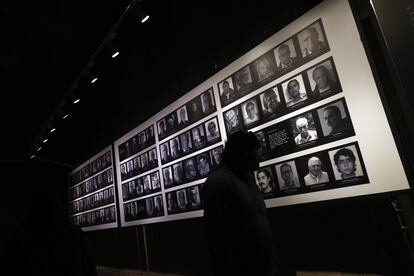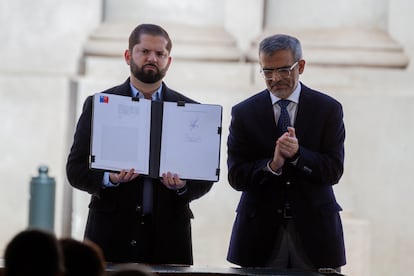50th anniversary of military coup reveals deep cracks in ‘electric’ Chile
The verdict in the Víctor Jara case half a century after his murder and the suicide of one of the convicted ex-military officers exposes the cracks in a country where no consensus exists on the condemnation of the September 1973 coup

President Gabriel Boric has called the atmosphere in Chile “electric” and while his supporters agree with him, the opposition is wondering how much the ruling party itself has contributed to inflaming public debate in the lead-up to the commemoration of the 50th anniversary of the coup d’état. Boric — Chile’s first president since 1990 to be born after the coup — sparked outrage last week after the final ruling in the court case over the death of Víctor Jara on 16 September 1973, where the Supreme Court upheld the convictions for kidnapping and homicide of seven ex-military officers. This was a demonstration of how long it has taken the justice system to provide answers: half a century.
Barely 24 hours had elapsed when one of those sentenced took his own life, at the very moment when the police were on their way to arrest him. Another significant incident a few days before the anniversary of the collapse of democracy was the death of Guillermo Teillier, the 79-year-old leader of the Communist Party of Chile, who authorized the assassination attempt on Augusto Pinochet in 1986 when he was in charge of his party’s military affairs. During the tribute ceremony, Boric said: “[Teillier] died as a dignified man, proud of the life he had lived. There are others who die a cowardly death in order not to face justice. There are human differences,” in reference to the suicide of Hernán Chacón Soto, 86, a retired Chilean Army brigadier.
This Sunday, after days of raging debate — the leader of the far-right Republican Party dubbed Boric a “coward” — the president sought to clarify his remarks in an interview with Canal 13′s Mesa Central program. The president said that he was “not the one to judge the decision to commit suicide” and that he respects the choice of those who do it for whatever reasons. “What I wanted to say, and I stress, is that there were those who committed atrocious crimes, for a long time they took pride in them, they hid them, they lied, they did everything they could to avoid justice and when the moment comes to face the consequences of their own acts, they shirk from responsibility in various ways. For me, this way out — I am not only referring to the case of Brigadier Chacón, but also to Augusto Pinochet himself — is an act of cowardice.”

Boric pointed out that two of the seven ex-military members convicted in the Jara case are fugitives. However, when quizzed on Canal 13 about the mercilessness displayed, he said: “The reference to cowardice was to the trajectory, not only in this case, but in so many others.” And in relation to Chacón’s suicide, he said: “It was not my intention, I apologize, and it does not add to the debate.”
This is part of the picture a week before 11 September in Chile, a country where there is no consensus on the condemnation of the coup, as analyzed in EL PAÍS by left-wing sociologist Manuel Antonio Garretón: “Unfortunately, there is no consensus in Chile on condemning Pinochet’s coup d’état,” he said in early July. And he explained: “The problem is that there is a significant section of the population that still vindicates the 1973 coup d’état. It is the 44% who voted Yes to Augusto Pinochet in the 1988 referendum and — exactly the same — the 44% who voted for José Antonio Kast in the 2021 presidential run-off, who claim that the coup was necessary or justified. But condemnation of the coup is an ethical principle that must be maintained.”
Chile is approaching this historic milestone with a debilitated left-wing government after two electoral defeats that, although not direct, strongly impacted on Boric and his generation’s roadmap. In last year’s plebiscite, on 4 September 2022, 62% of Chileans rejected a proposal for a major overhaul of Chilean institutions. Last May, Kast’s far-right party won a landslide victory in the elections for the Constitutional Council, the body responsible for drafting a new proposal for a Constitution that will be put to a referendum in December. “Chileans today are willing to sacrifice freedoms in exchange for order,” Chilean intellectual Arturo Fontaine said in March in an interview with EL PAÍS, in an attempt to clarify the apparent pendulum swings of the citizenry since the beginning of 2019 to date.
Just a few days before the commemorations begin — this week and until next Monday, numerous events, seminars and talks are being held all over Chile to mark 11 September, 1973 — the atmosphere is “electric,” according to Boric. A few days ago, analyst Max Colodro said: “Today, Chile is more divided and polarized.” “The social unrest opened up a new crack in Chilean society and brought political violence back to the forefront of the conflict. This was compounded by the heavy defeat suffered by the left in the constitutional process. I believe that this is one aspect that has exacerbated the atmosphere of this anniversary and has made it very difficult to commemorate it with a historical perspective, based on self-criticism from all sectors and the search for common ground that can help heal the wounds. It is deeply regrettable, but this anniversary will make Chile more confrontational not only about the past, but also about the present and the future,” the philosopher told EL PAÍS a few weeks ago.
The political climate is heated and is on display in Congress, where the right wing has shown how it has retreated from its own rhetoric on the coup and the dictatorship in recent years, probably as a result of the tension that the Republicans are putting on the right. If in 2013 President Sebastián Piñera set a turning point when he spoke of “passive accomplices” on the 40th anniversary of the coup, referring to civilians from the conservative camp, today in Congress declarations prior to the democratic rupture are reverberating.
On 23 August, Chile’s Chamber of Deputies re-read the 1973 resolution that accused the leftist Salvador Allende government of being unconstitutional, and which was perceived as an endorsement of military intervention. A number of far-right congresswomen have even expressed doubts about the sexual violence committed against the victims — mainly women — that has been so often proven in court.

President Boric’s government has struggled to push forward an agenda regarding the 50th anniversary. In early July, under pressure from the pro-government Communist Party and human rights organizations, the writer Patricio Fernández, the president’s advisor on these issues, was forced to resign. Subsequently, in the most recent cabinet reshuffle, the president removed the minister of culture, Jaime de Aguirre, who was tasked with coordinating the commemoration. Boric had to turn to an advertising agency to try to create a narrative along the lines of that sought by the president, on the basis of memory, democracy and the future.
Confronted with a majority of citizens who were not born at the time of the coup — close to 70% of Chileans — the government is pursuing an agenda in line with the most left-wing administration Chile has had since 1973: the so-called Search Plan for more than 1,000 of the dictatorship’s disappeared. This is Boric’s biggest gamble 50 years after the military coup and one of the South American country’s main issues. However, at the same time, the government is upping the ante and could close Punta Peuco, the prison reserved for human rights violators, which has been the subject of controversy since its establishment in 1995, at the height of the transition. The president neither denied nor confirmed this in Sunday’s interview.
Boric is even studying ways of releasing the Valech report in the context of the 50th anniversary of the coup. This comprises the testimonies of the thousands of victims of political imprisonment and torture who related the events of the dictatorship to a commission in the government of Ricardo Lagos, in 2003. Lagos himself, a socialist, explained the reasons for keeping the testimonies secret.
The political scientist Ricardo Israel, who gave testimony in the early 2000s, explained a few days ago on the social network X: “I gave the testimony of what happened to me to the Valech Commission. I had confidence in the commitment of secrecy for 50 years and I would feel violated if the government should succeed in breaking that rule.”
This is just a glimpse of the fractured Chile that is awaiting the commemoration, where ex-military officers who have boldly taken steps that deviate from the institutional ones, as is the case of the former commander-in-chief of the army, Ricardo Martínez, are scorned by some parts of the uniformed world. “No official truth or common narrative is possible, simply because in 1973 society was split into two halves and we are heirs to that fracture,” stated journalist Ascanio Cavallo a couple of days ago.
Sign up for our weekly newsletter to get more English-language news coverage from EL PAÍS USA Edition
Tu suscripción se está usando en otro dispositivo
¿Quieres añadir otro usuario a tu suscripción?
Si continúas leyendo en este dispositivo, no se podrá leer en el otro.
FlechaTu suscripción se está usando en otro dispositivo y solo puedes acceder a EL PAÍS desde un dispositivo a la vez.
Si quieres compartir tu cuenta, cambia tu suscripción a la modalidad Premium, así podrás añadir otro usuario. Cada uno accederá con su propia cuenta de email, lo que os permitirá personalizar vuestra experiencia en EL PAÍS.
¿Tienes una suscripción de empresa? Accede aquí para contratar más cuentas.
En el caso de no saber quién está usando tu cuenta, te recomendamos cambiar tu contraseña aquí.
Si decides continuar compartiendo tu cuenta, este mensaje se mostrará en tu dispositivo y en el de la otra persona que está usando tu cuenta de forma indefinida, afectando a tu experiencia de lectura. Puedes consultar aquí los términos y condiciones de la suscripción digital.









































